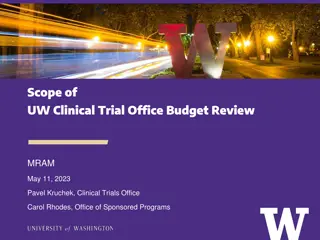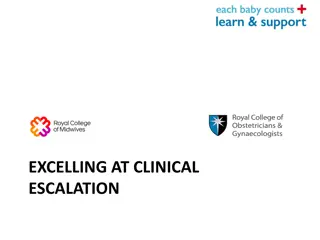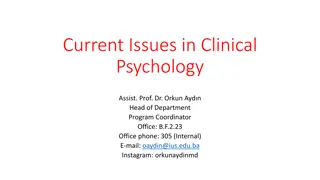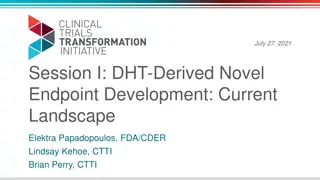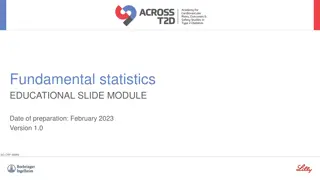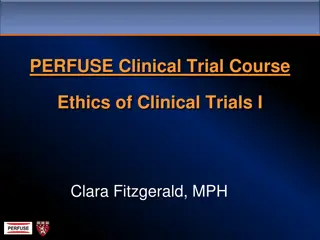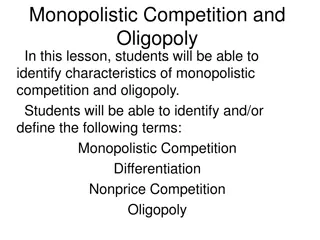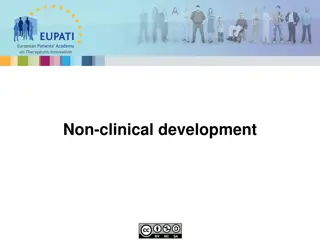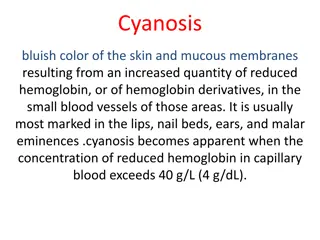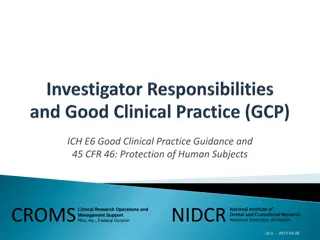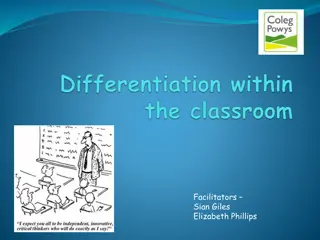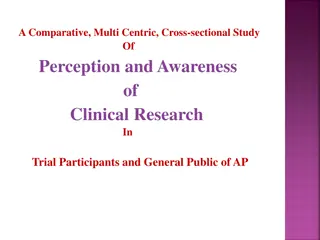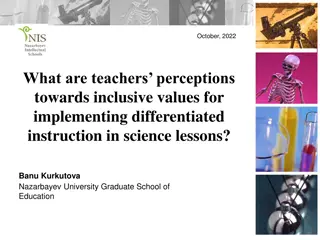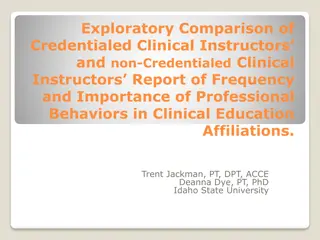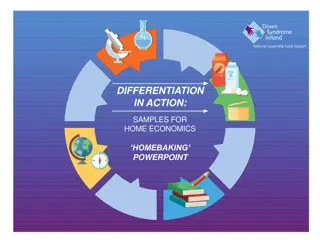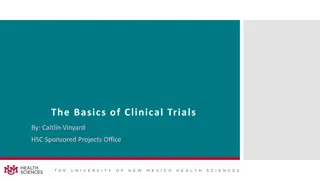Reimagining Differentiation: Enhancing Classroom Practice Through Learning Theories
Explore how theories of learning can inform effective adaptive classroom practice, focusing on the concept of differentiation. The presentation delves into reimagining differentiation, key theories supporting it, and practical strategies to support differentiation in language classrooms. The researc
0 views • 35 slides
Understanding Integral Calculus: Two Major Approaches & Antiderivatives
In this chapter, we delve into the fundamental concepts of integral calculus, focusing on two major approaches to mathematically generate integrals and assigning physical meanings to them. We explore antiderivatives, differentiation, integration, and the process of taking integration as the inverse
2 views • 59 slides
Overview of UW Clinical Trial Office Budget Review
UW Clinical Trial Office conducts budget reviews to ensure compliance and financial accountability in clinical trials. The office collaborates with various departments to manage billing compliance, financial risks, and institutional policies. The primary focus is on avoiding patient billing errors,
0 views • 17 slides
India Alliance Clinical & Public Health fellowship in India
India Alliance Clinical & Public Health fellowship in India\n\nIndia Alliance Clinical and Public Health Research Fellowships are for Health researchers with an MD, MS, MPH, or an equivalent clinical or public health degree, who can apply for the DBT\/Wellcome Trust India Alliance Clinical and Publi
0 views • 5 slides
Clinical Escalation: Building Effective Communication in Maternity Units
Exploring the importance of clinical escalation in maternity units, this session outlines the components and practices involved in identifying, communicating, and acting upon clinical concerns. It emphasizes recognizing deviation from normality, effective communication, and taking appropriate action
0 views • 27 slides
Training Models in Clinical Psychology: A Comprehensive Overview
Clinical psychology training models such as the Scientist-Practitioner Model have evolved over the years to integrate science and practical expertise. The Scientist-Practitioner Model, originating in 1949, emphasizes the fusion of scientific knowledge and clinical application. It faced criticism for
1 views • 98 slides
Ethical Issues in Clinical Pharmacy Research by Dr. Haider Raheem Mohammad
Research ethics play a crucial role in clinical trials and therapeutic research in the field of pharmacy. From discovery to validation, all medicines undergo rigorous evaluation processes to ensure safety, efficacy, and freedom from adverse effects. Clinical trials in both animals and humans are ess
0 views • 20 slides
Embryonic Development: Key Processes and Organization
Embryonic development involves neurulation, organogenesis, and morphogenetic processes that shape the nervous system, sense organs, skin, and other ectodermal derivatives. The embryo undergoes allocation and differentiation processes, influenced by epigenetic events and the action of organizers. Emb
2 views • 25 slides
Understanding Plant Embryogenesis: A Comprehensive Overview
Plant embryogenesis is a crucial process in the development of plant embryos from fertilized ovules, involving cell division, differentiation, and morphogenesis. This process leads to the formation of seeds, which play a vital role in the plant life cycle. The stages of embryo formation, structure,
0 views • 25 slides
Advanced Clinical Practice Framework and Pillars of Practice
The document discusses the advanced clinical practice framework and the four pillars of practice which include leadership & management, clinical practice, education, and research. It emphasizes the importance of core capabilities and area-specific competence in advanced clinical practice. The role o
2 views • 8 slides
Digital Health Technology-Derived Clinical Outcome Assessments in Regulatory Decision-Making
This session discusses the landscape of DHT-derived novel endpoints in clinical research, focusing on considerations for regulatory decision-making. It explains the use of digital health technology in clinical outcome assessments and highlights the potential benefits of digitally collected COAs, suc
0 views • 42 slides
Objective Structured Clinical Examination (OSCE): A Modern Approach to Assessing Clinical Competence
The Objective Structured Clinical Examination (OSCE) is a modern examination method widely used in the field of health science to evaluate clinical skill performance. It involves stations where medical students interact with simulated patients to demonstrate competencies such as history taking, phys
1 views • 40 slides
Development Stages of Inner Enamel Epithelium
The life span of cells in the inner enamel epithelium can be divided into six stages: Morphogenic, Organizing, Formative, Maturative, Protective, and Desmolytic. Differentiation of ameloblasts occurs in various regions of the tooth germ. Amelogenesis, the enamel formation, takes place during the for
0 views • 48 slides
Understanding Magmatic Differentiation and Magma Mixing
Magmatic differentiation is the process through which a single homogeneous magma can produce diverse rock types by generating fractions of different compositions. This variation in igneous rocks results from mechanisms like fractional crystallization, liquid immiscibility, vapor transport, and diffu
1 views • 29 slides
NIMH Clinical Research Education and Monitoring Program Overview
NIMH's Clinical Monitoring and Clinical Research Education, Support, and Training Program (CREST) aims to ensure the proper conduct, recording, and reporting of clinical trials. This program includes clinical monitoring plans, guidelines for site monitoring activities, and independent clinical monit
1 views • 29 slides
Understanding Statistical Methods for Clinical Endpoints in Diabetes Research
This educational slide module delves into fundamental statistics for analyzing clinical endpoints in diabetes research. It covers the choice of statistical methods, the distinction between statistical and clinical significance, and the importance of different endpoints in evaluating clinical benefit
1 views • 37 slides
Understanding Ethics in Clinical Trials: A Comprehensive Overview
Explore the historical context, important ethical guidelines, and the ethical framework with 7 principles in the field of clinical trials. Learn about key trials, ethical considerations, and guidelines governing human subject research in clinical medicine. Delve into the critical aspects such as inf
1 views • 15 slides
Understanding Monopolistic Competition and Oligopoly
Learn about the characteristics of monopolistic competition and oligopoly in the marketplace. Discover terms like Monopolistic Competition, Differentiation, Nonprice Competition, and Oligopoly. Understand how monopolistic competition involves similar but not identical products, while oligopoly is do
1 views • 15 slides
Understanding Tiered Assignments for Effective Student Differentiation
Explore tiered assignments as a form of differentiation in education, providing multiple levels of tasks to meet students' varied readiness and interests. Discover how tiering assignments can enhance learning outcomes by tailoring challenges and support to individual student needs across various tas
0 views • 25 slides
Understanding Non-Clinical Development in Therapeutic Innovation
The European Patients Academy on Therapeutic Innovation focuses on the non-clinical development phase of medicine, delving into efficacy assessment, safety evaluation, and manufacturing process considerations. Non-clinical studies are essential for decision-making in clinical trials, marketing appli
1 views • 26 slides
Understanding the Fundamental Theorem of Calculus
The Fundamental Theorem of Calculus states that if a function is continuous on an interval and has an antiderivative on that interval, then the integral of the function over the interval is equal to the difference of the antiderivative evaluated at the endpoints. This concept is further explored thr
0 views • 14 slides
Understanding Cyanosis: Causes, Types, and Clinical Differentiation
Cyanosis is characterized by a bluish discoloration of the skin and mucous membranes due to increased levels of reduced hemoglobin. This condition can be categorized as central or peripheral cyanosis, each with distinct characteristics and causes. Central cyanosis results from decreased oxygen satur
0 views • 13 slides
Understanding Evidence-Based Medicine and Clinical Decision-Making
European Patients Academy on Therapeutic Innovation emphasizes the importance of Evidence-Based Medicine (EBM) in providing optimum clinical care. EBM involves systematic review and utilization of clinical research for informed decision-making, benefiting patients in disease management and treatment
7 views • 20 slides
Essential Aspects of the Clinical Interview in Psychology
Clinical interviews play a crucial role in the assessment conducted by clinical psychologists, showcasing essential qualities like validity, reliability, and clinical utility. Understanding the importance of feedback and honing general and specific skills as an interviewer are key components in cond
1 views • 17 slides
Strengthening Differentiation Through Effective Questioning Strategies
Strengthening differentiation in teaching through a range of questioning strategies is crucial for promoting deeper thinking and engagement among students. By encouraging more questions and focusing on the process of inquiry, educators can ignite curiosity, creativity, and critical thinking skills.
0 views • 23 slides
Clinical Research Guidelines and Regulations Overview
Clinical research encompasses various guidelines and regulations to ensure the protection of human subjects and the credibility of study results. Key aspects include Good Clinical Practice (GCP) standards, Title 45 of the Code of Federal Regulations (CFR) Part 46, and additional CFR sections for cli
0 views • 46 slides
Understanding Differentiation in the Classroom at Coleg Powys
Differentiation in the classroom at Coleg Powys focuses on identifying and accommodating different learning styles, exploring barriers to learning, and incorporating strategies to teach individuals effectively. The session emphasizes habits of mind like listening with empathy, thinking flexibly, and
0 views • 12 slides
Ohio Clinical Alliance: Transforming Clinical Experiences
The Ohio Clinical Alliance, through collaborative partnerships, aims to enhance clinical preparation for educators. The leadership team comprises various representatives and organizations committed to improving student learning. Their activities include retreats and meetings to ensure effective comm
0 views • 27 slides
Implicit Differentiation Explained: Techniques and Examples
Learn about implicit differentiation, a technique used to differentiate functions without rearranging them. This process involves differentiating both sides of an equation with respect to a variable, allowing you to find derivatives of functions where equations are not explicitly expressed in terms
0 views • 13 slides
Upper Respiratory Tract Infections: Clinical Features and Management
This presentation covers the differentiation between viral and bacterial infections, clinical features and management of sore throat, sinusitis including allergic rhinitis, otitis media in children, and modifying help-seeking behavior in patients with flu illness. Pre-test questions are also include
0 views • 75 slides
Perception and Awareness of Clinical Research in Trial Participants and the Public of Andhra Pradesh
This study focuses on understanding the perception and awareness of clinical research among trial participants and the general public in Andhra Pradesh. It highlights the importance of creating awareness about clinical research, previous study results, public attitudes towards clinical trials, and e
0 views • 24 slides
Professional Development Insights in Education
Online courses and trainings like Reading Across Content Areas, Gifted Education 101, SIOP Training, and AVID Training have provided valuable instructional strategies and insights for enhancing literacy, working with diverse student populations, and promoting higher-order thinking skills in the clas
0 views • 19 slides
Enhancing Classroom Differentiation Strategies for Student Engagement
Effective differentiation in the classroom is crucial to cater to diverse student needs and enhance engagement. Implementing strategies like top and tail activities, careful target setting, individualized next steps, and more can help teachers create a more inclusive and engaging learning environmen
0 views • 15 slides
Teachers' Perceptions on Inclusive Values for Differentiated Science Instruction
Explore science teachers' perspectives on inclusive values for implementing differentiated instruction in science lessons. The study focuses on understanding how teachers perceive inclusive values in facilitating differentiated teaching, their perspectives on differentiation, strategies for implemen
0 views • 13 slides
Comparison of Professional Behaviors in Clinical Education
Professional behavior characteristics play a crucial role in enhancing student learning during clinical education. This study examines the differences in reported importance and frequency of professional behaviors between credentialed and non-credentialed clinical instructors. The background outline
0 views • 28 slides
Enhancing Clinical Academic Collaboration Between Universities and NHS Trusts
Clinical academics play a crucial role in integrating clinical practice, research, and education within the NHS. Collaboration between universities and NHS trusts is key to ensure clinical academics address the right questions for patient care and societal benefit. Challenges include an aging clinic
0 views • 29 slides
Understanding the Process of Reversing Differentiation
Reversing the differentiation process involves finding the function knowing its derivative. By increasing the exponent by 1, dividing by the new exponent, and adding a constant term, the antiderivative of a function can be determined. The general form of an antiderivative involves adding a constant,
0 views • 13 slides
Teaching and Differentiation for Children with Special Educational Needs
Understand how to effectively teach and cater to the diverse needs of children with special educational requirements, covering areas such as SEMH, communication, interaction, cognition, learning, and sensory/physical needs. Learn about the importance of high-quality teaching, differentiation strateg
0 views • 15 slides
Differentiation in Action: Samples for Home Economics Home Baking PowerPoint
This PowerPoint presentation showcases samples for home baking in the field of home economics, demonstrating practical applications of differentiation strategies. The slides cover various aspects of home baking, such as ingredients, techniques, and recipes, providing valuable insights for educators
0 views • 13 slides
Understanding Clinical Trials: Phases, Types, and Definitions
Clinical trials play a crucial role in advancing medical research and treatment options. This comprehensive guide covers the basics of clinical trials, including their definition, phases, types, and key definitions like IND, IDE, NDA, and more. Discover how different phases of trials work, the vario
0 views • 16 slides


